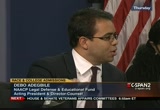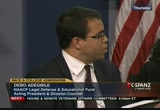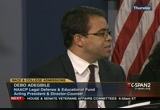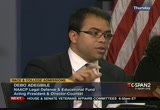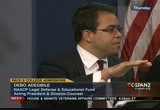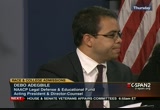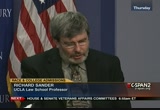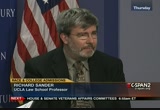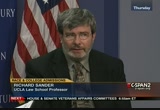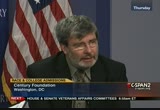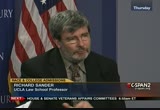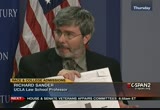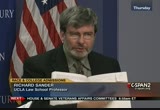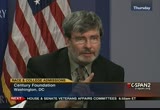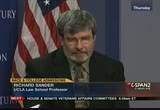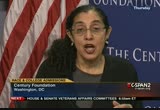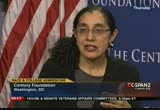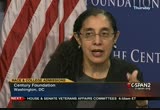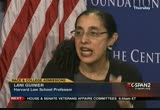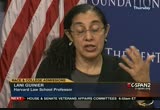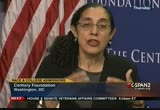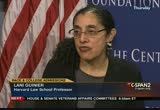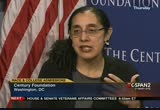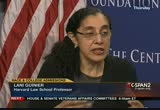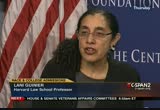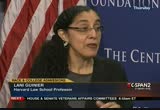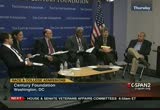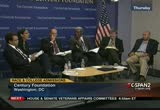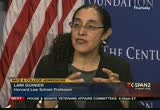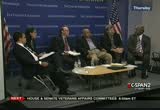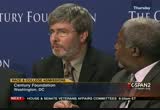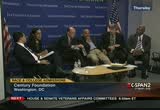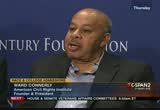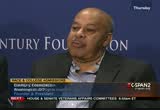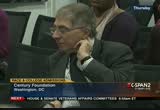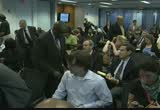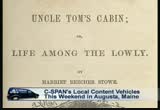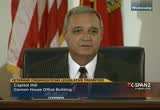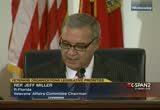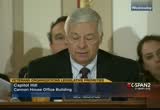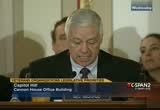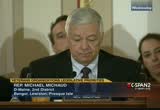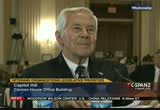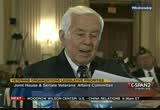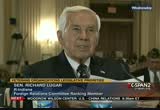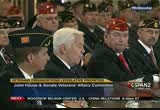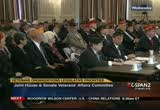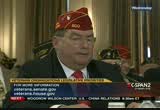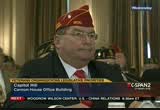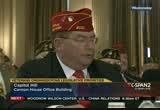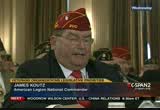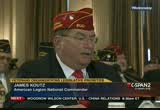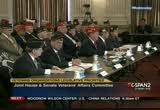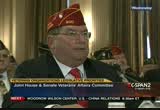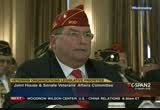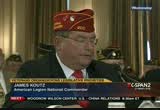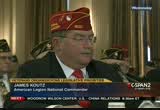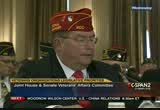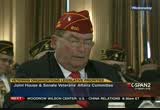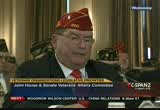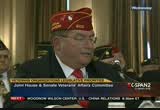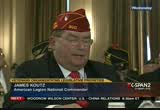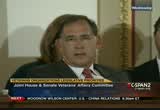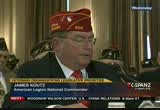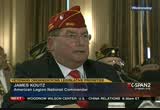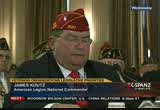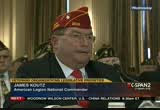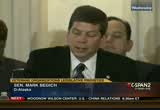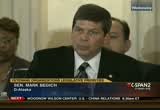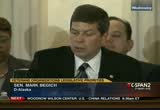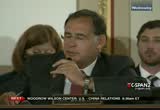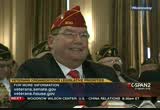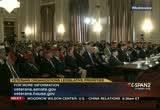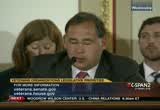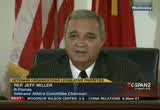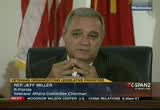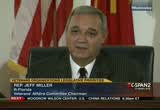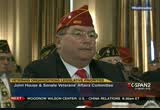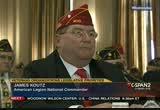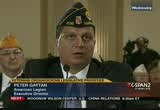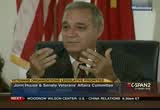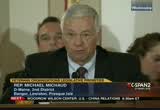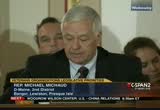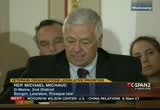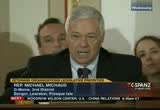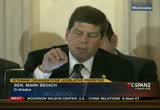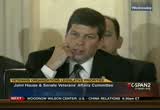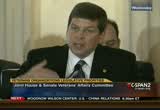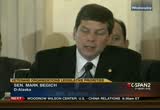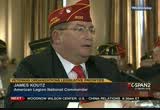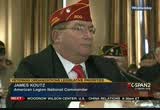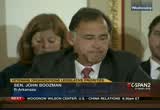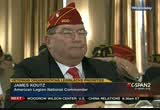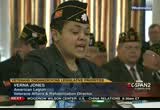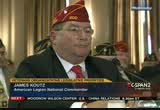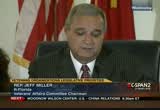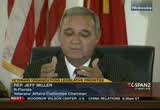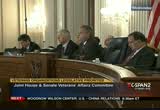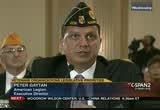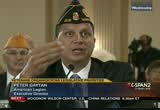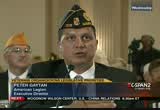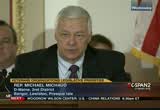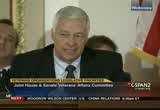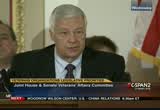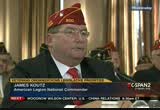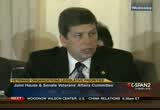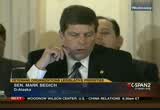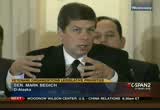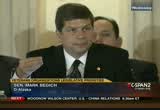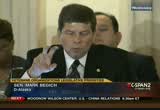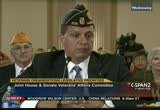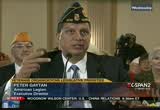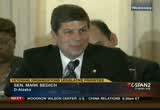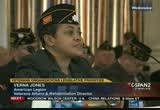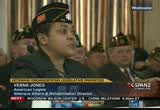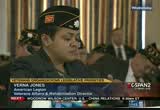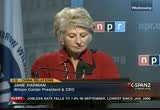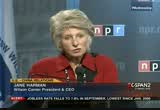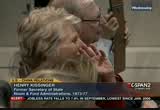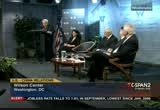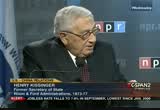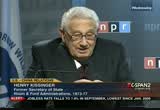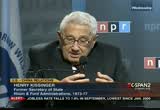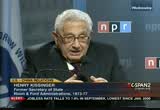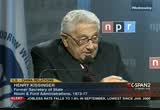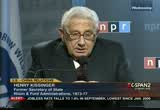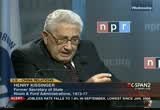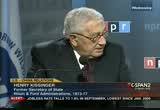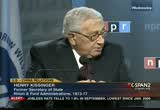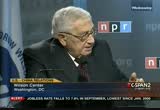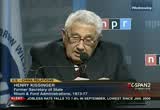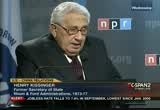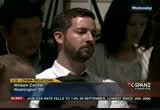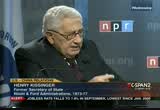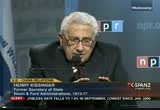tv Today in Washington CSPAN October 5, 2012 6:00am-9:00am EDT
6:59 am
7:00 am
briefly. but instead of me going through a complete statement i ask unanimous consent that i can enter the full statement into the record. and with that i would like to go ahead and introduce -- let's see. mike, do you want to give a quick opening statement? >> thank you very much, mr. chairman. i, too, would like to welcome national commander here this morning, as well as the national president of the american legion auxiliary also. i want to thank both of you for your advocacy for our veterans and enduring support that the american legion's of over 2.5 million members have given for our veterans. before we start i also would like to extend complements to
7:01 am
your washington, d.c., staff, to let you know that the staff here in d.c., it's a pleasure working with them but they also are out to each and every day fighting for the american legion's priorities. so want to thank you, national commander, for an excellent staff you have here in washington. and i also would like to recognize in the audience the folks from maine who took the time to be here today. i know they think -- i think they're still out in the audience. will be maine american legion members please stand up? i'd like to thank both of you for coming here today as well. [applause] these committees are charged with oversight of the department of veterans affairs and the das budget. and while it has been busy and frustrating, we been able to accomplish a lot over the last
7:02 am
couple of years. we must also make sure we provide the best care and service for our veterans. and we need to first of all understand how the veterans population is growing, changing and where they're located geographically. and in 2011 we just over 20 million veterans with 34 million dependent and we have 450,000 survivors of deceased veterans receive compensation. i was pleased the va's budget for 2013 reflect many of these changes, but they must do better outreach for our veterans, particularly those who live in rural areas, and to better with the dependence. the va 2013 overall budget is $140 million, an increase from 2012 request. and because of the hard work of many individuals here in this
7:03 am
room, advanced appropriations continue to help the va with long-term planning with advanced appropriations ensure sufficient, timely, predictable funding for veterans health care. but advanced appropriations only work when we worked together to pass a long-term appropriations bill as well. short-term continuing resolutions are not helpful in the planning process, but we've got to do better as members of congress on both sides of the aisle. although congress may disagree on a lot of things, i hope that we can agree on providing strong appropriation for the va. in a nonpartisan effort. in that regard i would like to thank chairman miller for all the hard efforts, work that he is done on the house side to make sure that the committee worked in a bipartisan manner. i was troubled by the july report from cbs news that found suicide rates for our soldiers
7:04 am
is up 80%. our veterans are returning rom were with invisible wounds that needs treatment, but are discouraging for seeking those treatments for various reasons. and as a nation we can do better, and we must get this right. into the american legion, i ask you to continue help in this regard, as you lobby the committee on veterans affairs. i hope you're also lobbying the committees on armed services to make sure that they are dealing with this issue as well. care must begin with the person who is on active duty, before they take off the uniform and become veterans as well. service members also if you look at another area, we've got to do better on, and that's for military training. look at jobs. service members are experienced in many different career fields. that can be ferried, such as
7:05 am
electronics, medicine, air traffic control's. and we've got to do everything we can as a congress to help our veterans find jobs when they come back. and i think it's important for the american legion to have a broad outreach and all the different states to make sure the states are doing the same thing as well to make it easier for our veterans to find jobs as well. and with that, for the remainder of my statement, be included in the record. and i ache in want to thank you, national commander, for being here today, and all members from the american legion. so thank you spent without objection to order. senator boozman is going to yield his time at this point. senator lugar, i understand you have a prior commitment, and so in keeping with your schedule, we appreciate you being here today to introduce a national commander for 2012 and 2013,
7:06 am
commander of james koutz. we appreciate you being here. you don't remember this but i met you for the first time in 1977 up here in washington, so i have great respect and admiration for you, senator, the senior senator from indiana is recognized. >> understand -- i deeply appreciate this opportunity to address this joint committee in order to introduce a very distinguished hoosier, american legion national commander james koutz as he presents his organizations current priorities to this committee. over the course of my service in united states senate, i've had the distinct honor to spend considerable time with hoosier servicemembers and veterans from all branches of the military. each time i'm reminded of how important we are as a nation to
7:07 am
have so many young men and women who are willing to step forward now to defend the ideals upon which our republic was founded. as one of our duties in congress to ensure that those who bear the considerable burden of defending our nation in the military service receive the care and support they have earned upon their return to civilian life. since its founding in 1919, the american legion and its members have worked closely with officials at the local, state and federal levels in providing that support. i'm also very proud to note that the american legion is headquartered in my hometown of indianapolis, indiana. i was especially pleased to meet with jim most reflate in august during the american legion's 94th national convention in indianapolis. where he was elected to serve as national commander. he brings a wealth of experience
7:08 am
to this post. this includes his own service, united states army in vietnam, more than two decades in the private sector with mx coal country. his election as a county commission in worked county, indiana, and his service to veterans of our state as a member and president of the indiana veterans affairs commission. i'm confident the talent and diligence he has exemplified have been the hallmark of his career to date, and they will continue to will serve the american legion during his term of office. i would like to again thank the leadership and members of the respective veterans' affairs committee assembled here today for calling this important hearing. i wish jim and his wife, vicki, every success, and they're important service to the 2.4 million veterans that make up the american legion. and i look forward to learning
7:09 am
much more about the american legion's important budget priorities, and supporting those in the future. i thank the chair. >> thank you very much, senator, for being with us here today, and we know that your schedule is tight this month, so whenever you need to depart, please feel free to do so. and commander koutz, you are now recognized. >> thank you very much, mr. chairman. i want to thank the senator, my senator from indiana, senator lugar, for that kind introduction. good morning, chairman miller and members of the committee. first, let me state that how proud i am that you to contest his pow-mia flag and empty chair behind me. i understand this is the first time, and i hope it's not the last time. 90. on behalf of the 2.4 million members of the american legion, i appreciate the opportunity to
7:10 am
testify before you this morning. prior to getting into the details of our written testimony of a like to introduce some of the national officers that will serve with me this year. as i call the names i ask that they stand and be recognized. national vice commander davidow out of west virginia. lane hickman, department ohio. james holland, south carolina. james nitties and from new hampshire. and jeanette rai from nevada. our national sergeant at arms from indiana. our national adjutant dan wheeler. after national treasure. please stand and be recognized. thank you. [applause] >> i would like to take a moment to acknowledge some special men in the audience who fully
7:11 am
comprehend what i'm just beginning to understand what it means to sacrifice a year of your life to be the face of this great organization. pass national commanders of the american legion. gentlemen, we please stand and be recognized. [applause] next i was to introduce leadership and american legion auxiliary, the nation's largest patriotic women's organization. please stand as i call your name and be recognized. national president peggy thomas from virginia. national vice president nancy brown park from california. national secretary mary buckler from indiana. [applause] we also have several pass national president joining us today. i would like for them to stand
7:12 am
and be recognized. with us it is a national commander of the sons of the american legion from the department of pennsylvania. chris, please stand and be recognized. [applause] in addition several of the men present dedicated their lives to service national commanders of the sons of the american legion. gentlemen, will you please stand and be recognized. most important i would like to take this opportunity to introduce and thank my wonderful wife, vicki, my best friend. vicky. [applause] a month from now you a citizen will go to the polls across the country and cast ballots in a general election. washington will be focused on the great landscape beyond the beltway. that's where i come from.
7:13 am
that's what you find american legion. you will find american legion rural towns on the west hoping veterans make that for our trip to va medical center. american legion's hosting more than 200 job fairs throughout this nation. american legion service office are working day and night to help veterans understand their va claims and file applications that won't get stuck in a massive backlog. the american legion is in your district, your hometown and your neighborhood. for nearly a century this organization has filled the spirit of its federal charter in ways they can't easily be quantified. the suffice it to say that millions of volunteer hours are put in for legionnaires, millions of real dollars are raised to help veterans and their families, and millions of lives are touched every year all through america by the american legion.
7:14 am
by the end of my year of office i was been more than 300 days traveling the nation, and sometimes beyond, visiting veterans, active duty troops and patriotic americans everywhere. i have a rare and unique opportunity see the faces into the stories of those who have sacrificed on behalf of our nation. they will asking what the american legion is doing for them today. and they will ask me what their elected officials are doing for them. they will want to know what you are doing to make things right for america's veterans, their families and communities. they have a good reason to ask him as today's generation of troops come home form work, they're unsure about the future, where will their jobs come from? what if they can't get the war out of their minds? what if they need a doctor now, but they can't wait to see one in a month? they want to know what massive
7:15 am
cuts to defense budget will mean to small businesses and factories that supply defense contractors and honor veterans. will these businesses be shut down? what we can our national security because a weakened economy? these are tough questions. veterans need to know that the american legion and our elected officials are working hard to resolve these issues. these men and women have sacrificed in ways we are only beginning to understand. their families have and will, it's truly up to us to ensure their sacrifices are rewarded, the promise of a brighter future. that brighter future we all know depends on the ability to earn a decent living. in my written testimony you will find jobs among american legion's list of priorities.
7:16 am
a struggling economy is specifically improved career prospects for veterans. will go a long way towards solving the number of problems facing our nation today. it's no secret that a large percentage of american veterans are struggling to find work, having faced jobless rate is much is two-thirds higher than in the comparable civilian population in the past year. the american legion has been to the forefront of efforts to combat veteran joblessness, and we all know we have an allied in this congress. specifically, i understand the progress made of military experience for credit store licensing and credentials and the number of trades and career paths for veterans. it's just common sense that those who drove him these two firefights and delivering supplies to forward operating
7:17 am
bases, i to have a leg up when they pursue over the road truck driving. certification as civilians. medics have saved lives on battlefields don't need to start at less than one. when you're working to become civilian emts. the american legion has been fighting this battle longer than anyone else. since our landmark licensure and certification for veterans in 1997 we have worked with concerned parties and both the government and the private sector. we have been on the hill at the pentagon, the department of labor, side by side with representatives and presidential task forces, and in the boardrooms across this country, and it is bearing results. we work best to make -- with legislation such as the recent vow to our veterans act. and the veterans skills to jobs
7:18 am
act of 2012. we are grateful for this dedication and cooperation that congress has shown us on this issue. clearly you have heard concerns of veterans and we appreciate everything you've done to improve the situation on the federal level. but we cannot let up as the american legion works to capitalize on these games and increase our efforts, we need to support to keep working with the states to improve their incentives -- acceptance of military training as the federal government has already done. legislation like -- to recognize military training, education and experience. the american legion is now working with groups such as american national standards institute, the solutions of information design, to advise u.s. army training and doctrine on credentialing to evaluate the
7:19 am
programs being provided by these men and women still wear the uniform. we all need to recognize the top quality education and training, men and women of the united states armed forces receive when they are serving our country. we are working with the united states chamber of commerce, military.com, and recruit military llc, from big cities to small towns, from convention centers to american legion posts. if you're not into one of these events, i strongly encourage you to do so. there he will see firsthand the quality of these returning servicemen and women, employers who understand their value, and legionnaires who are dedicated to improving their lives. the men and women who fought for this country should have to fight for a job when they return
7:20 am
home. veterans, their families and american legion will keep working to revive our nation's economy. efforts to improve opportunities through licensing and credentialing, for job fairs and business development must continue in earnest. for mainly newly minted veterans the ability to get a job and earn a decent income has been diminished because of the sacrifices made in uniform. that is why we simply must come up with a solution to a problem that has been with us for years. unfortunately, it has gotten worse. the v8 claims backlog. i would challenge anyone in addition to recall a time when the american legion did not come before this congress looking for answers to this worsening problem. veterans in every corner of the nation, many of whom wait months or even years or decisions about
7:21 am
their claims. this is not just some nagging bureaucrat can use. the claims backlog which is now hovering at about 1 million cases is a gathering storm of mistrust between those who fought for the nation, and those who promised benefits, if they should become disabled. our governments failure to decide their claims on time is on excusable. va's efforts to detain the backlog of not produce positive results. american legion service officers are working around-the-clock to help veterans through the process, and we all know that va help solve the problem, which is clearly is not enough. secretary shinseki has promised to break the backlog by 2015, and yet with more new claims outpacing decisions we're going the wrong direction.
7:22 am
congress can no longer simply be concerned about this problem. congress, the a and american legion must work together to solve it. and that does not mean simply rewarding processors for fast decisions, regardless of quality. we have found an alarming amount of an accuracy of claims decisions made at the va regional offices throughout the country, and that only slows down the progress. earlier this year when congress somewhat american legion service officers for hearing about the backlog, we were encouraged. these service officers at the front line of the battle every day. they have unique perspectives that can help va contend with its biggest issue. we have seen many pilot programs and promises from va. it's time to roll up our sleeves and really fix what's wrong with this system.
7:23 am
if the social security administration and other federal benefit programs can handle their claims in a timely manner, veterans cannot understand why the va cannot. in the american legion we have made trending our service officers a top priority. it's part of the job, not something that gets in the way of the job. we bring our service officers together for training twice a year. they make recommendations based on a complex system. they must navigate on a daily basis. they are the ones who can see the flow and the va work credit system that rewards quantity over quality. there simply has to be a better way to get this done. for instance, va can start counting things done right as a positive, and claims done wrong as a negative. so everyone can have more accurate picture of what's really getting done in these regional offices.
7:24 am
veterans waiting to pass a realistic target date might be compensate with interest on their claims. creating an incentive for va also to get these claims decided on times. there are ways to work with the mechanics of the system, to make it serve the veterans and not the bureaucrats. we are willing to roll up our sleeves and work with you to find those ways. american legion has people in the trenches who not only understand the problems, but can contribute to the solution. veterans are tired of hearing how the government is working on in a backlog that continues to grow. veterans in the american legion want results and are willing to do whatever it takes to obtain them. remember, we are all partners in this. everyone knows the claims process is confusing for veterans. american legion is there with free service to help navigate
7:25 am
the system and make things easier for both the veteran and the va. personnel who have decided their claims, nobody gets charged a penny for this service. not a veteran, not the government. we're out of working to put these claims in order. you help make it easier for the second by putting them in touch with the people who are dedicated their time and effort to make the process easier for those veterans. we work with congressional charter veterans organization take it transition veterans in touch with the people who can make the system run more smoothly. if you work to hand them off to us we will not forsake that trust. we work to make them, that transition into a proud patriotic and productive phase of the life as a civilian veterans. the american legion understands
7:26 am
that our nation is in a budget crisis to the likes of which has not been seen in over a generation. first and foremost our nation's veterans are deeply concerned about the national security, the face of what drastic defense spending cuts. equally important, the american legion, the protection of the va and veterans programs administered in other federal agencies. thanks to the timeless work of this committee, especially you, airman miller, congress and white house have reassured us that the a will miss the sequestration. unfortunately, many programs important to veterans are funded by agencies outside the va, arlington national cemetery, american battle monuments commission, the joint prisoners of war missing in action accounting command, and department of labors veterans program, hud, and others.
7:27 am
veterans are seriously concerned these important government functions will be compromised or cut in order to make him speak. and that does not begin to address the massive cuts that would be levied against our nation's defense. which is posed in fully half of the $1.2 trillion burden that could not be relieved by the supercommittee last winter. the department of defense is asked to bear this burden. while the u.s. men and women are still at war with hostile enemies in afghanistan and all around the world. the american legion has been promised that the budget would not be balanced on the backs of veterans. if department of defense contractor, diminished quality of life our troops or put more pressure on the national guard reserve components, it is clear that an unfair portion of
7:28 am
responsibility is falling upon the shoulders of americans current and future veterans. while the budget does not fall squarely on the house and senate veterans affairs committee can we urge you to work with your colleagues to find the right balance without sacrificing our nation's ability to defend itself, or to care for its protectors. i am grateful for the work this congress has done on behalf of our veterans. i will tell legionaries and anda family so of this country that their elected officials are, in fact, working with us, the stakeholders, to solve some very serious problems. i will explain to them that our voices matter in washington, and we are being heard. now it is time for all of us to act on those voices to make good to the men and women who have served. i thank you for the opportunity to come before you, and renew a
7:29 am
commitment the american legion, to work closely with congress, ensure we are meeting this nation's obligations to its veterans. since 1919, the american legion has been there for america's service members, veterans, and their families. our organization is a voice with hundreds and thousands of men and women serving today in the military who are unable to speak for themselves. the american legion is there for millions of veterans, many of them either are too proud or too humbled to demand the benefits they have earned. the american legion is there to give you elected officials a direct link of communication with a very special breed of constituents. those have pledged their lives to the nation we all love. there's much more than a political sense than to address the question, problems and issues our nation's veterans and their families face today.
7:30 am
it is a sacred obligation. i think we all can agree on that. thank you. god bless you, and god bless the united states of america. thank you. [applause] >> thank you very much, commander. we appreciate your testimony and look forward to an opportunity to ask some questions momentarily, but senator begich from alaska has arrived, and since the house had an opportunity to get our opening statements prior to your comments, i'd like to recognize senator begich. good to see you. >> thanthank you very much. appreciated. i'll try to be brief government first, commander, thank you for being here. thank you for your testimony, and all the members that are
7:31 am
here, today, i know as congress, the senate is out the first couple of us here. we wanted to make sure the senate is well represented. we care deeply about what's going on with the veterans and the issues of our veterans community, not only in the nation but all across, in our state, for example. and also i want to make a note of past national commander jimmy foster. i caught a glimpse of him over here. thank you for traveling all the way from alaska to be here. you and hawaii, you should get the special award for traveling the distance, so thank you very much for being here. thank you thank you for once again having this joint meeting. it's always important for us here in washington to hear from all of you and what we need to be doing, how we're doing, what job improvements we need have with regards to our veterans. as well as and i know at times would talk about our active military, too, and i know you've lots of ideas in that arena so please don't hesitate.
7:32 am
as you know this summer congress passed a pretty significant piece of legislation honoring american veterans, caring for camp alleging act of 2012 which really helped to improve many fronts enhancing specialty adapted housing programs for disabled veterans improving the va ability to end homelessness among veterans, finding health care for veterans, family members were exposed to toxic drinking water camp lejeune speech moving deficiencies. but as we all know, more can be done. with regards to moving our claims forward and expanding critical health care for our veterans. and a special thank you to the va. i know we're always trying to hold an account aware doing a good job and sometimes i to push him a look at extra. there's one thing they did for rural alaska veterans which was critical. and i want to thank your organization for helping us support this effort and that is the va and gaining health services historic act of
7:33 am
cooperation are now ensuring that veterans who are in rural alaska, which in some cases, 80% of our communities are not accessible by road. so they can't get into the veterans and and go down to the clinic because there is no fan to take into the clinic because there's no road to take into a clinic. you have to fly at the end of the day could be 1000 or more dollars. but they are now in a cooperative effort to ensure that veterans, no matter where they live, in any rural part of alaska, they're going to get access to quality health care. and that to me is a huge step for our thousands of veterans in alaska. so thank you to your organization to help support that effort, and thanks to the va for being a little innovative in their efforts. so thank you all very much for being here. >> thank you very much, senator. i would also like to recognize my friend from arkansas, senator boozman.
7:34 am
>> thank you, mr. chairman. it really is good to be with you, and congressman the shoddy. many of you know that i served in the house for a number of years and served with these guys for a long, long time. and there's nobody that puts veterans first communal, in regard to you guys do a great job. battle you but it's also a pleasure to be with your staff on both sides, both the senate and house staff. this is kind of a unique opportunity serving in the veterans' affairs committee and the house or senate but this is an area where we really do work and get along and do things in a very, very bipartisan manner. which is so important to senator begich, it's great to be with you. senator begich is a new friend. he and i have worked together on a number of bills, having to do with women's issues, having to do with transition assistance program and things like that. congratulations, thank you for being here, commander.
7:35 am
we appreciate you so much. your testimony was great. i also want to thank peggy for all that you do. we know who really does of the work amongst the group. i have a wife and three daughters, so i'm very, very aware of that. but we do appreciate all that you do. at the also it's so nice, mentioning your wife, your partner and friend and things. and my dad did 20 years in the air force, and i think it's representative, or helped through the years, but it also so represented when you're in the military, it's not just an individual thing. it takes the whole family. and so we appreciate her being here and representing that also. i want to recognize our folks from arkansas, and our state commander, mary is here. where are you? very good. thank you for being here but and also are deep and steep. we appreciate you all so much, and all that you do to work so
7:36 am
hard for our veterans in the state of arkansas. he have a number. certainly this is a very critical time for our nation's veterans, and it's so important that the legion, you know, so important you are here. don't ever underestimate how important it is to be here again telling your congressman, your senators, their staffs, which sometimes is even more important, telling their staffs are important these things are as we move forward. i know that all americans are very concerned about employment security, but veterans in particular struggling with meaningful employment and careers. this is certainly a very difficult economy. you mentioned, commander, about hire a hero act and the veterans skills to jobs act. as you said the official to step in the right direction, again, everyone deserves credit in a
7:37 am
very i personally and moving that forward. yet they're still a number of things that we can do and will do in that area. on the other hand, we have to be careful. certainly want to do these efforts. we can't do those by mortgaging the futures of our children and grandchildren by borrowing money from people like china. so we oh this again to our veterans, incense other honor and sacrifice. but we can do that. like i say, we can get that done and we will get done. the failure of the joint deficit committee has left us with looming arbitrary cuts. those will be mentioned both from up here in down there. i'm pleased that the house essentially passed a bill that said no. these are painting cuts. you aren't going to affect military families. and certainly i think that's all of ours position. we'd like for the administration
7:38 am
to clarify better that that is set in concrete, and so again certainly as you said, commander, we must make it perfectly clear that under no circumstances we cannot and will not balance the budget and solve our fiscal problems on the backs of our men and women in uniform, and our veterans. [applause] >> i thought you all were napping. [laughter] and again, the good news is that i think we're all on board. thanks for your efforts with suicide prevention. that's something we're working on very, very hard here. there's just a number of things that come in regard to that. the other thing that i'm concerned about is military voting. that's something them if anybody has a right to vote, it's the men and women who are serving overseas. and so again i think in a very
7:39 am
bipartisan way we are working to ensure that that's not going to be a problem. so we're going to press on forward in that front, and we appreciate you all so effort in doing likewise. so again i thank you for being here, and now let's go ahead, mr. chairman, i know we have some questions. >> thank you very much, senator. we appreciate your comments. and again, because we have two house members and to senators, we made dispense with the typical five minute question period. i worked on the ask a question and then turn to mr. michaud or senator begich so we can kind of have a little more free flow of discussion than we normally would in a process like this. i do want to draw attention to the fact that you congratulated or thank the u.s. chamber of commerce for the job fairs that they're holding around the country. i had the opportunity a week ago monday, or tuesday i guess it
7:40 am
was now, to be in west palm beach with alan west down there attending a job fair and function. they have been all over this country. for some reason they haven't into my district yet. we will see if we can fix that, but your organization and there's have been collaboratively, and we know that because the unemployment rate is so high among our returning veterans, something has to be done. we see a lot of the corporations around this country, and small businesses as well, that are joining together to make sure that we can use the talents that our military men and women have when they come home, and transition back to civilian life. and that is something that, again, you have helped us get that word out to many of the states governors around the country that, in fact, their jobs that they had in the military certainly should transition well into the private
7:41 am
sector. i have said it many times. i've got a good friend is a homebuilder. he said give me someone who's been in the military that knows how important it is to show up to work every day on time, has good critical skills, decision-making skills, and i can teach them how to build a house. but bring some who knows how to build a house and this absence of those goes, it's very difficult for me to be successful. and it's very, very true. without him want to focus all of it, and i'm sure -- >> can i just add -- >> no, no. [laughter] spent very shortly. you know, he talked about, the chairman was talking about these job skills. last night i got up at 5:00. i had a 6:00 flight celis at the airport at 5:00 so i was up at 4:00 the but before that i was riding with the little rock police department, you know, throughout the different areas, you know, just trying to get a feel for how we could be helpful. but one of the things i mentioned was how desperately
7:42 am
they need veterans, and how much they like returning servicemen and women. a great job that they do. one of the things they mentioned was the training process, it takes a long time, and it just goes, to what we've talked about getting certificates the military so the military policemen, once he completes his training, he's given a certificate. they can take certificates from other training states and things like that, but they don't have the ability to do that there. so it just highlights what you are talking about, how we can do some of these things. again, to very quickly put the men and women in the workforce. >> very true, because it's also a process of putting them together. the folks are looking for people to want to work and getting the people who want to work and that's where military.com and monster.com and a lot of other organizations have done a great job, although the job is yet to be finished, but they are helping put those folks
7:43 am
together. but i want to hone in for just a minute on the claims backlog because i think obviously that is a huge issue that is out there that everybody in this room is concerned about. congress is concerned about it. the department of veterans affairs is concerned about it, but it doesn't seem to be getting any better. secretary shinseki has already said several times, you quoted in your opening statement, that by 2015, you know, within 125 days, you know, the idea was that everybody would have their claims adjudicated at 100%. well, it is inhabited and, unfortunately, we had a hearing just a couple of weeks ago -- it isn't happening. we took a status check to the va, where are you. their focus was more on what they were turning out which is exactly what you talk about. and that's important, 1 million claims being adjudicated. but the backlog is growing.
7:44 am
and if you not keeping up with a backlog it's certainly not going to assist and fixed the problem. so again, i would like to hear from you, if you would, your perspective on what are the things that can be done, what can congress do legislative, issue will go to assist a problem? we all talk about electronic medical record but that is years away from being able to truly have that seamless transition. we are moving in that direction but we've got folks today that awaiting one, two years in order to have their claims adjudicated. we've put dollars forward. we've put bodies forward. it does not seem to fix the issue so i'd like to hear what you think. >> well, mr. chairman, i think one of the things that we could do is do more hiring for adjudicated, do more hiring of
7:45 am
processors. as you probably know, a lot of these claims that are coming back, are not completed, they need to be fully developed claims. i believe like any other business, if you're in the backlog, the way to get that backlog took care of is hiring more people. and i understand in the va being a former, are still a commissioner of indian department of veterans affairs that it takes time to train. adjudicator or a claims processor. it will take time, but maybe come at a doubling of how much overtime they are working, if they are working overtime, but i think they've got to do these claims more accurately. because when they come back, the first thing we see is a mistake
7:46 am
and that claim goes right back and we're starting all over again, step one. so i think that's the biggest thing is maybe if the accuracy, what the secretary said he would like to have 98% accuracy. if we get to that number, and i think you'll see the backlog's claim be reduced. >> do you know the percentage of claims that your service officers put together are adjudicated, complete? imai, they may not necessarily get the rating they are asking for, but the percentage of packages that are completed? >> i don't know what -- peter can probably answer that for y you. >> mr. chairman, the american legion takes very seriously the quality of our work and our training of our service officers. twice a year with better service officers through rigorous training to ensure that they have the qualifications, knowledge and skills, to not
7:47 am
only produce quality fully developed claims that we submit to the va, but also to reduce the backlog because it's going to be a team effort to do that. we are going to have to have asked the commander said qualified, well-trained service officers to do this for. your specific question on the number that the american legion adjudicates, i would like to defer to our va director, verna jones who handles that area. >> thank you, mr. chairman. we actually see the report from the va just last week. i can take a number of claims. the american legion handles 244,000 claims and you. that's our number this year, 244,000. i'm not sure the exact percentage by the number is 244,000 for the american legion nationally. >> if he would just for the record, if you could let us know just the percentage. i'm trying to get a handle, you know, on how many claims are being done by the veteran
7:48 am
themselves. out of using the veterans service officer. you know, the assumption from my standpoint was it would be better to go through a service officer in order to buy your claim. but i'm interested in knowing, for no other reason that i think folks up here on -- mr. michaud, do you have a question? >> thank you very much, mr. chairman. i would also like to thank senator boozman for his very kind and generous remarks. very glad to see you haven't for gotten the how she came from. you are willing to come back over on the house side. really enjoyed working with you, and continue to work with you. once again i'd like to thank you for coming here today, to put forward your ideas with the american legion would like to see congress do with some concerns that you currently have out there. and the american legion is a strong advocate for our veterans, and for all those who have served, and that's known
7:49 am
throughout the halls of congress. i want to take this opportunity, however, to today discuss an issue that is really important to our troops and for our country. we all remember the outrage this summer when it was discovered that our olympic athletes were wearing uniforms made in china. i think we should be as equally outraged about the fact that our troops are not wearing 100% american made uniforms. our soldiers put their lives on the line for us. they should fight in uniforms that they can trust. uniforms made in the u.s.a. next week i'll be going to a funeral for a soldier that died over in afghanistan and maine. when you talk about uniforms
7:50 am
made in the u.s.a., i read an article, i let you copy, i know you haven't had a chance to read it yet, but i'm not the only person who was upset at what's happening with our military today. i was reading an article in the air force times what it says, master sergeant says no to chinese made goods. he was issued a pair of chinese made goods. he made a stink about it. he ultimately did get american-made boots. he was sent to afghanistan, and over in afghanistan was given a uniform, the army operation enduring freedom camouflaged uniform. he asked for a pair of required boots, and boots. well, guess what? he was issued a pair of chinese made goods once again. in the article you will see a massive sergeant at the and, and
7:51 am
i would like to quote it, but the master sergeant said. i quote, this is about patriotism. this is about following the very a minute set forth over six years ago. this is about american soldiers wearing our country's uniform made by americans. and i couldn't agree more with the master sergeant. at a time when our nation is divided into discourse in washington, d.c. is extremely negative, it seems to me with the outrage for our athletes wearing chinese made uniforms, that this is one issue we all can agree on. even those candidates who are running for president of the united states are criticizing one another about not being tough on china.
7:52 am
in both campaigns are talking about making sure more things are stamped with made in the u.s.a. well, there's a way we can get tough on china. increase of things made in the u.s.a., and to make sure that our american soldiers are not treated as second class citizens, that they have the best. that's what they are fighting for, this country, united states of america. and i find it extremely concerning, because this issue is not an issue that needs congress to act. it's not an issue that we need a regulatory agency to address. it's an issue that's already the law. so my question to you, what is american legion's position -- deeply that our soldiers that
7:53 am
are putting their lives on the line each and every day for us, should they be wearing clothing made in the united states of america? >> the answer is yes. the american legion believes that -- [applause] >> i'm should the american legion and american people believe that all of the equipment should be made in the united states of america. and there you go again, talking about jobs. put americans to work making these boots. that will provide jobs here at home. star i want to thank you very much, national commander. and just for the record, i know congressman duncan hunter who is a republican colleague from california, he and i are writing a letter to encourage your colleagues to sign that letter, to the administration requiring them to comply with the intent
7:54 am
of the law. and it's unfortunate we have to do that, and hopefully we will see some changes in that regard. take you very much. i yield back. [applause] >> senator begich. >> thank you very much. just a couple questions. i wanted to mention also, in march, we are going to hold a jobs fair for veterans. and it's an interesting thing. when you do these jobs fairs there's an incredible amount of folks that come out. and i just met this morning, why i was later, i was meeting with franchisors, new franchise businesses, restaurants and so forth, they have a new initiative to help veterans get in the business so we are very excited what's happened with the small business committee regarding our veterans. ms. jones, you mentioned 244, give or take, thousand claims you processed.
7:55 am
do you keep track of the acceptance rate, and what i mean is you submit them, how often do they got to make it through the system successfully? what is that percentage? >> thank you, sir. because it takes so long for those plans to travel through the system, it's almost impossible for us to keep accurate account of how many of them are awarded, how many of them are denied. but i will tell you that after board of veterans appeals we keep track of the amount of planes that are -- claims that overturn. we're at 76% claims that a been adjudicated in air and overturned by the board of veterans appeals. the va put out an annual report that breaks down how many claims, how may have been awarded, how many of them have been denied. but they don't break them down by a deal or by the part of a to for ease veteran service or
7:56 am
organization. >> it's maybe something would ask that the to do a record pace because i would be good because my that is your office is doing a great job, and that's my bet. if it's working so successfully. maybe there's an opportunity to streamline it even more. so if you are already having a very high success rate and acceptance of these claims, then maybe there's a way to look at the process and slim it down a little bit on the va side because your rate of success in doing the claims as successful as you are doing them should be a benefit to you all and also the veterans who are receiving the benefit so maybe there's an opportunity if we measure the success rate. >> absolutely. affymetrix would ask the va for those numbers just yesterday. we expect to receive it shortly and will get you a copy. >> will you share that with this individual or the two committees? that would help us i think make the case of why your service
7:57 am
officers can process these very successfully and, therefore, maybe there is again i know that the duplicate some of the work, it's likely we can cut some of that out make it a little faster and based on your past success rate. so let's take a look at that. the second thing i guess, commander, maybe you can answer this but maybe you can give some comment on it with regard to the mental health services. i know it's a big issue. we are struggling, i know the armed services committee which i also sit on, we have been successful and nobody mental health service providers in the battlefield at that level rather than waiting for folks to come home and tried to figure out what to do at that point. we are tried to step it up on the front end. it's been very successful to some degree, but i know the va is agreeing to hire more providers, and services, but the challenge is getting more in the pipeline. so maybe you can give some thoughts there. i know the bill we passed
7:58 am
earlier, i had an amendment which was successful which ensured that the use mental health services through telemedicine which is proving to be very successful. no co-pays are required anymore which is a huge step to getting better access. but do you have any thoughts or ideas on how we can get more mental health service providers and veterans access to those folks? >> well, hiring more mental health health services or providers with the percentage of these troops coming home with traumatic brain injury, ptsd, we know that that's going to increase, going to increase immensely. i think we are going to have to get where we can train these people so that we can take care of the soldiers when they come home. i don't know the rate. i think of what i'm understanding, the rate is maybe 50% if not more of these
7:59 am
returning soldiers coming back from afghanistan and iraq that are having these two problems with tbi or ptsd. i think the sooner that we can get this job done the better off we're going to be. so we can take care of the soldiers when they come home. >> very good. let me, mr. chairman, i have just one quick question. i've got most of your testimony as you were just starting, and i just want to ask, i didn't hear you mention the g.i. bill, and it is one if there's issues or the success of the g.i. bill, or are there things we should look at to improve. i know we made one improvement this last couple of years, and we're getting a lot of use of the g.i. bill, but is there any thoughts you want at on that issue while you are here? >> the g.i. bill is in good shape right now. the only thing i think that the american legion is concerned about is that we need to keep watching and see how things are going with the g.i. bill in case we need to improve it. there's always room for improvement in g.i. bill, but right now we have now major
8:00 am
issues with the g.i. bill. >> very good. thank you very much. thank you, mr. chairman. >> senator boozman. >> thank you, mr. chairman. commander, you can have great benefits but if you can't access them it's a real problem, and i know that you all have been working hard for our rural veterans, you know, trying to ensure that accessibility is there. .. >> again, if you could elaborate a little bit, that would be
8:01 am
helpful. >> well, the american legion believes that to take care of this real health care problem we have, that we need to administer clinics, more outpatient clinics, more doctors so we can take care of concern as you heard in my opening statement, i said some veterans are driving up to four hours. >> right. >> and then when they get there, they probably can't get in. so the problem is that we don't have enough staff, doctors, the medical equipment. so if we maybe add staff, administer clinics -- add more clinics to take care of the rural veteran, i think that would be a big asset to helping these veterans. >> and telemedicine, vans? >> sure. >> things like that, very good. we do appreciate your efforts in to doing that. it's interesting, we're working with senator franken, and you have some large cities in his
8:02 am
state, but it's a very rural state as is arkansas, so many of the places that we represent. i mentioned the licensing and, you know, how it came up with the police. i foe you all are really on -- i know you all are really on the cutting edge of that, you had a summit. can you tell me a little bit about how that went ask some of the suggestions, perhaps, that you have in that area? >> i didn't understand your question. >> the credentialing, making it such -- >> licensure. >> yes, sir. >> just like the veterans skills and jobs act, you know, i said in my statement if you're a humvee driver over in iraq or afghanistan, dodging ieds and land mines, when you come home, you ought to be a truck driver. or if you're a medic, you ought to be able to come home and not go through step one of being an emt in civilian life. so i think, you know, the
8:03 am
credentialing -- i think you're working in the right direction, and we're working in the right direction to make this better for our veterans and our service members when they come home. >> you, the congressman, the chairman mentioned what's on all of our minds, you know, the backlog and the stuff, how can we be helpful. can you describe in a little bit more detail the claims coach, mobile phone, the app? you know, what that's going on about, how that's going to be helpful? >> i would let verna jones answer that question. >> sure. >> thank you. i think the mobile app is set up to help veterans download applications on their mobile be phone that will help them find a service officer. it will help them out on what documents they need to bring in,
8:04 am
and it'll even help them put in their zip code and determine which veteran service officer is closest to them. so the mobile app sets the veteran up so that when they walk into the veteran service officer's office, they're more or likely to have a fully-developed claim. we're excited about the mobile claim app and hope that more veterans will download that claim app to help them get ready to tile their claim. >> very good. that's excellent. i think that'll be very, very helpful. one, just one last thing, commander. can you elaborate on your comment regarding the va health care system that growing numbers of female veterans in a system that has traditionally catered to men must adapt to meet the unique needs of today's veterans' population, you know, with us having so many more females in the military? and i guess if you could elaborate on that and really
8:05 am
tell us how you feel like the department can improve the delivery of care and benefits to an increasing number. not only do we have a large number now, but we have an increasing number of female veterans in need of va services. >> well, with the 0% of our -- 20% of our military force being female nowadays, we believe we must have better medical care, we must get the doctors that can take care of our female veterans in the these va clinics. you know, from what our understanding is on a survey that we took, there was only 25% of the female veterans that felt that the va medical system was better than going to their own. i think that we can maybe just do a little better job with taking care of our females. i have in what i've been trying
8:06 am
to do is get a woman veterans' coordinator in every department in the legion. and once we get all that committee together, i'm hoping that the american legion will get tease women -- these women, female coordinators together, and they can tell us the needs that they need to have, and then we can relay it to you. >> very good. thank you, commander. mr. chairman? >> thank you very much. you were talking about the g.i. bill and some of the education benefits. one of the things that the legion can help us with as we have just changed into a new fiscal year, and that's with the vrap program or the veterans' retraining assistance program. we, department of veterans affairs, did 45,000 -- or labor -- 5,000 applications approved. there were many in the queue
8:07 am
that were waiting. we actually authorized 99,000 total. as of today the numbers that i have there are 63,844 applications of which 50,000 of 'em were approved. so there's still, you know, roughly another 36,000 folks out there that can access these benefits for retraining. so i would like to ask for your help with the legion's help in getting the word out to those individuals. you know, we focus a lot on the younger returning veterans but, obviously, this is focused on 35-60-year-old folks to get them retrained to come into the work force. and so i just bring that to your attention. you had talked about the hire heros act, that was parking par. so we'd like to ask for your assistance with getting the word out on that. also, we were talking about
8:08 am
mental health. anytime you talk about going outside the norm, we get some visceral responses. but we had a round table discussion with some of the, um, veterans' service organizations recently here in talking about mental health and how do we get the patient to be able to get to the provider as quickly as possible? and it takes va so long to hire somebody, especially somebody it is a credited with some type of medical degree, whether it's a nurse, physician, psychologist, psychiatrist, optometrist, whatever it may be. and there's been some discussion about opening tricare to give the option for folks to either stay in the traditional va track or go into the tricare system. it's still being managed, their
8:09 am
care being managed by va, we could double the amount of providers overnight if we were able to do something. and does the legion have a position, are you willing to look at these options to help solve what literally is a crisis in this country? our mental health backlog out there is something not to be proud of. we've got to provide it quickly to those that are in need wherever they may be, and some of them are in rural areas, and it's very difficult to do a lot of it via telehealth which senator begich has talked about telehealth and the great success. but mental health may be somewhat different especially in the very beginning. so i'd like to ask what the legion's position, if any, on exploring the opportunity. >> well, just let me say a few words before i turn it over to
8:10 am
our executive director, peter gaytan. we understand that's a big issue. we understand there's problems there, and we understand that we're going to have to train the people to take care of these mental health. you know, a lot of these mental health people probably don't even want to come to us. today want to stay in the back. but i think with your help and our help that maybe we can go to those people and get 'em out and come and get the help today need. so with that, i'll turn it over to peter, our executive director. >> thank you, mr. commander. and that is a real issue, what you're bringing up, beginning with the access to mental health. the access to mental health right now, um, is efficient. you mentioned telehealth. va is utilizing other resources like telehealth, and it is going to be a growing problem in terms of mental health care. but specifically with the suggestion of opening up i tricare and utilizing tricare, the american legion was at that round table, and we appreciate the invitation.
8:11 am
it is something we're taking under consideration to consider. we'd like to see the reality of that being in effect. will it -- how much will it improve our veterans' access to mental health care that they need? when you were looking at the new demographics of returning veterans, and we've talked about rural health care -- and the american legion published a report earlier this year focusing on rural health care -- we as a nation, we're relying more and more on our guard and service members not only to serve, but to serve in combat zones. they're returning to rural areas, they're returning to areas that aren't supported with military treatment facilities, areas that may not have a va facility close by. and tear not just coming back -- they're not just coming back to the support of a unit that they know, they're thrown back into the civilian world. and that time between the pressure of combat to the time they're walking down main street, usa, is short. so those individuals are the ones we need to capture and utilize new ideas like tricare,
8:12 am
telehealth, even contracting out specialized mental health care when appropriate. not a blanket statement that we can allow our veterans to go down the street, but in specific areas, specific cases where we know that we can reach that veteran in a timely manner to protect them and hopefully reduce the suicide rates, those are the things we need to look at. so i this i the tricare discussion, and i appreciate the opportunity, that tricare discussion is just part of a larger equation of how can we develop as many options as possible to reach these returning veterans who have these very dire mental health care needs. and, yes, va is getting overwhelmed and, yes, va does take a long time to hire, train and utilize new employees. and this is an area we need to concentrate on. i think, i can tell you that the tricare issue brought up, the american legion is studying, considering, talking to you and your staff to better understand those options, but i think you and we have an obligation to realize how much that tricare
8:13 am
opportunity will help the situation and what else needs to be added to that so we can reduce the mental health care -- improve mental health care access and reduce the effects that our combat troops are coming back and dealing with. >> thank you. mr. russo? >> don't want to get too comfortable with this gavel here next to me. [laughter] thank you very much, mr. chairman. i'd like to, actually, follow up on that same line of thinking. when you look at a state like maine, we're a very rural state, and access is an extremely important issue. and when you look at what we're seeing in the military today with the increase in suicide rates as well as within our veterans' population, female veterans i just saw a movie, documentary the other day, "the invisible war," with sexual
8:14 am
assaults and some of the problems that our female veterans have. so access is extremely important. first of all, like to thank the american legion once again for putting out a system worth saving. i think that's definitely a very good document that i enjoy reading every year because it really highlights some of the issues out there in the va system. following on the same train of thought that chairman miller brought up, when you look at access whether it's tricare, whether it's utilizing our federally-qualified health care clinics, i can understand some of the concerns that veterans might have, and i, too, to not want the va to just be an insurance agency where it's, you know, va will pay for services outside. because i think there's a very important role for the va to play. but also i believe that we knew we have to do everything we can to make sure that our veterans get the health care that they
8:15 am
need when they need it. and when you look at the fact that the mental health, secretary shinseki has agreed to hire 1,900 mental health and associated workers, with that the problem being there already is 1,50 vacancies for over a year in the mental health area. 1,500. i'm very glad that your looking at the tricare system, and i think it's very important that we look at everything that we have to to pick sure that they get the -- to make sure that they get the care that they need. i guess my question would be b in that same vein, is if you look at rural states such as maine, when you look at uniqueness whether it's alaska or some states that have a lot of islands and veterans trying to get, you know, the health care that they need when they need it, would you also be willing to look at in the rural areas if they do not have
8:16 am
tricare is services in those particular areas, if there might be some collaborative effort that we could utilize federally-qualified health care clinics or rural hospitals to get those types of services? and once again, i'm not advocating that the va sends everything out because i don't think they should. but i do think that there have to be some medium ways where we can look at the veterans as getting the care that they need. at the same time, making sure that the va medical facilities are still our primary focus for our veterans. do you want to comment on that? >> well, we're willing to probably work with, work with you on anything to be sure that we get our veterans took care of. the main thing is that they get the proper health care, and especially the parental -- the mental health issue. because, you know, as you talked about the suicide rate, that's
8:17 am
something that it's, we've got to be sure that we get that nearly stopped. there's way too much suicide going on, and it's not just the iraq and afghanistan veterans. there's still vietnam veterans that are doing it every day. don't know what the answer is, but i wish there was an answer for, that we could take care of these service members that are doing this and the veterans. but i guess we're willing to work any way we can to take care of it. >> senator begich. >> thank you, mr. chairman. i just have a couple quick more questions, and i apologize, i may have to depart here. i want to follow up on the mental health issue, and i know as just mentioned the amount of mental health providers, the va is moving forward into hiring. the challenge is tear process of
8:18 am
hiring and also -- their process of hiring and also making sure the supply line. and i hate to be so accuracy about it, but you've got to have enough people in the pipeline who want to take those jobs in a huge and growing field nationwide not just for our veterans. so we have a huge challenge. so we may have to be more creative in insuring that we get mental health providers working for the va or at least in cooperation with the va and also recruiting, because the mental health services that our veterans will need will not go away after just a few months. thai going to be around -- they're going to be around for many, many, many years, so we may want to think about how we incentivize folks to get into this field of mental health services who then work for the va and/or work with the va. and so that's something a thought we should think about and maybe some suggestions back from you folks. the other piece is i know the big issue when we dealt with utilizing our indian hills
8:19 am
services which are actually run by the alaska native tribal consortium for health care delivery within our rural parking lots of alaska was the -- parts of alaska was the quality of care. veterans want to make sure whatever happens that they get quality care. no matter where it is, they want quality care. the va offers a certain level, and these other agencies offer less, and that was the big concern. what we found, what our veterans have found and their organization found that our tribal consortium delivers equal or better care than the va. but we never take the choice away from the veteran. the veteran can go to the va hospital or the va clinic or utilize this service. and we think it's going to increase capacity. so i think there are innovative ways to insure the core of the va is strong, stable and growing, but also making sure we utilize some other arenas that we put and pour in a lot of
8:20 am
federal dollars in delivering remote health care systems in very rural areas, and i think there's a great way to insure that we can keep equal or better quality for our veterans. so as you hook at this, i think we're all going to be very interested in your suggestions. along with that, we were able to put into the defense authorization bill language for active military. we need to do the same thing for veterans, and that is if you're a veteran and getting mental health services, say, here in washington, d.c., then you go home to alaska and you want to get that same mental health service provide tore provide for you, if they're not licensed in alaska, not going to happen. in the active military, we've put some language in an amendment i put in to make sure no matter where you go, you can still access that doctor. because with mental health service, it's a little different than a physician taking care of, maybe you had a hand injury, mental health provider is all
8:21 am
about a relationship that you're building with the provider. and so it's critical that that veteran continue to have that care from whoever they need and want from wherever they are in this country. and we gotta think about that. and so i think there's an effort we need to do like we did in armed services with veterans, the same kind of language to insure that no matter where you live, you can access that. now, i know i'll get in trouble with every state with their medical boards and jurisdictions and all that gobbledygook that gets into that, but at the end of the day if we have a veteran who's receiving great care, they should get it wherever they move. that's why we did the telehealth medicine no co-pays anymore. is as you're tic these things -- as you're thinking about these things, help us here. the other one on the tap program, as you know, this has been a challenge. the tap program. and i know it's being piloted now, a new one by the vets, by
8:22 am
vets at the department of labor. i don't know if you have any feedback yet from how that's working or not working, and i don't know if anyone can comment on that. but as you know, when i first came here four years ago and they told me it was 160 or 170 slides in a powerpoint, i said, are you kidding me? i wouldn't even pay anticipation to that. attention to that. and we read a lot of material around here. it was a dysfunctional element to transition our folks back into civilian life. so does anyone have any comments on this pilot program that's working or at least started now? >> we actually had staff attend the first new tap pilot are program -- >> yeah. >> and it was mixed information that we received. we sat in with the briefings. um, we were impressed with some of the information that was delivered. we were very impressed that it's going to be mandatory which it should have been a long time
8:23 am
ago. what we are doing is giving our feedback back to the va -- >> excellent. >> -- and letting them know where we think not only they can improve in their delivery of information, but where they can utilize resources like the american legion to express to these individuals how we can help them when they transition. in fact, the american legion has taken the initiative to author letters to the secretary and other ors to ask if we can -- and others to ask if we can work together in a more collaborative way. for you and dod to share the information on these transitioning veterans so we can help them before they take the uniform off. and when they come back to their rural communities where the american legion lives and exists, we can provide that much-needed help that they may need to access va, to understand the va. we know the va because we live and breathe it every day. when they're going in a direction in their lives they didn't consider before, the american legion has a track record since 1919 of helping those individuals. va and dod should
8:24 am
8:25 am
but having you involved is critical. veterans being the test pilot, in essence, on this is create corral to make sure -- critical to make sure this works for veterans who need that information. so i thank you for that. if i can ask one quick question, ms. jones, and then i'll cease at that point, if that's okay, mr. chairman. ms. jones, i know we talked a little bit about women's veterans and what's happening. @, you know, i know -- it's, you know, i know it's a critical issue what we're doing, and it's more almost a wrap-around service in a lot of ways from if everything not only the health care necessary and also the childcare and other things. can you tell me the one or two or three top items that women veterans are saying to you that i wish we could do, you know, fill in the blank? can you do that for me? >> yes, thank you. you know, 2010 the american legion, as we told you today, women veterans survey, this is the first national women
8:26 am
veterans survey done since 1985 when the va conducted a survey. you know, a lot of things have changed since 1985. we had a survey for about 30 days, and 3,012 women responded. we asked them six or seven questions to measure ten attributes, and what they told us is they want -- it boils down to quality health care, affordable medications and fair and equitable compensation just like our male counterparts. women want to be able to walk into the va health care and receive the gender-specific health care that we deserve. recently, i was in the hospital in february. i stayed in the emergency room for 15 hours because they didn't have a room for a woman veteran. 15 hours with a life-threatening condition because they needed to find a room for me. women veterans deserve to go into the va health care system and to the hospital and get treatment as wick ri and as -- as quickly and efficiently as
8:27 am
our male counterparts. what women want is to be understood there are gender-specific differences that we want medical professionals to understand that women need particular things. mammography is one of them. all of the mammograms are outsourced, so we go out on a fee basis to get those, to get our mammograms. but it takes a long time to receive, um, the results. what we want is for the va to understand that while we have gender-specific differences, we still deserve the same time limits that they give to, in some ways, our male counterparts. what we're asking for is not a separate facility to walk into, we want to go into the va health care system, a system that's provided for veterans, that's built for veterans, that understands veterans to include female veterans. but maybe a separate be waiting room, especially for those who suffer with ptsd specifically due to military sexual trauma. when the law was reduced, the
8:28 am
standards reduced for men for ptsd, they left out military sexual trauma. today failed to reduce the standards, and women -- they failed to reduce the standards and women, largely in part women, providing the burden of proof for women on proving their claims for military sexual trauma. we want to be included in that liberalized law for ptsd. so what they told us is that we want fair treatment, and we want the va to understand that women are large part of our military, and when we come home, we want to be cared for just like our male veterans. >> very good. thank you very much. thank you, mr. chairman. [applause] >> senator boozman. >> thank you, mr. chairman. i really don't have anymore questions. the -- i appreciate your comments and especially coming from somebody, you know, that can relay their personal experience is very, very important, and i appreciate you
8:29 am
sharing, you know, your particular ordeal. and that's certainly something -- i know the committee on both sides, you know, are going to be working hard to try and remedy. there's simply no excuse for that. so thank you, commander, for being here, and we just appreciate your service, appreciate everyone's service so much, all that you all represent. and, again, we look forward to working with you in the next congress, and, again, just appreciate all of your efforts. >> we thank you, and just let me say that the person legion is always here -- the american legion is always here. we want to work with you to do the best we can for the veterans of this nation. >> i would ask unanimous consent that all members would have five legislative days to revise or extend their remarks or include any extraneous materials for today's hearing. without objection, so ordered. and be let me finish, commander, again by saying thank you so
8:30 am
much for being here, being willing to spend your time helping us understand more what the american legion's perspective is. and i can clearly say that without your help the job would be a whole lot harder. so i look forward to working hand in hand with you as we move down the road together and try and solve the issues that are there. we look forward to having another vso round table early in the next legislative session which is right around the corner. we know we've got election in just a few weeks and a lame duck session, and then we'll be returning for the 113th congress. is i appreciate you being here, i appreciate everybody being here for your session in washington, and with that, this hearing's adjourned. [applause] >> today a discussion about google and whether or not the
8:31 am
company is violating antitrust laws. law and economic professors will examine google's behavior in the marketplace at a forum hosted by the american enterprise institute. we'll have live coverage beginning at 12:30 eastern time here on c-span2. >> almost 20 years ago, we broadcast one of the most controversial stories in our 34 years -- 44 years on the air. it was called, yes, but is it art? i was accused of being a philistine, someone lacking the aesthetic sensibility to appreciate the challenging nature of some contemporary art. in those 20 years, works that i questioned -- worth hundreds of thousands of dollars -- are now worth hundreds of millions. >> so what made everybody so mad 20 years ago? >> i discovered something that i
8:32 am
had absolutely, could barely believe; that when you question someone's taste in art, it's more personal, for probing than politics, religion, sexual preference. it's something that goes to the very soul when you say, you bought that? >> 60 minutes' morley safer on his career at cbs and journalism today. sunday at 8 on c-span's "q&a." you're watching c-span2 with politics and public affairs. weekdays featuring live coverage of the u.s. senate. on weeknights watch key public policy events and every weekend the latest nonfiction authors and books on booktv. you can see past programs and get our schedule at our web site, and you can join in the conversation on social media sites.
8:33 am
>> on november 8th china will have new communist party political leaders. former secretary of state henry kissinger and a former u.s. ambassador to china, stapleton, roy, talked about the upcoming congress in china and what the change means for u.s./china relations. this discussion was hosted by the wilson center in washington d.c. >> good afternoon. i'm jane harman, president and ceo of the wilson center. welcome to those in the audience as well as those tuning in via c-span and live webcast. it's great to see -- i'm looking for him -- ambassador jim sazzer. is he here? no? our former ambassador to china under president clinton. he was to be here with his cautious elizabeth. i know -- his daughter, elizabeth. i know his daughter's here.
8:34 am
ambassador wolfgang who was ambassador to the united states during a very tough and important period in our relationship. he's here in the front row. he is also currently chair of the munich security forum, something i have attended for 11 years and henry kissinger has attended for many, many years and gave a wonderful speech here at the wilson center on the e.u. partnership just a couple days ago. earlier this year, the wilson center joined forces to create this public event series we call the national conversation. our hope is that this series will provide the public with new opportunities to engage in much-needed civil discourse free from spin. let me try that one on you again. laugh civil discourse free from spin. imagine that in this election season, especially on the day before the first debate. in the safe political space that the wilson center provides.
8:35 am
it is an honor to introduce my friend, dr. henry kissinger, who will be giving a brief keynote on china's upcoming once in a decade leadership transition and the potential opportunities for the united states. after his speech npr's melissa black will introduce the other panelists and moderate a discussion. melissa, who won't introduce herself so i'm going to say something about her, is a 26-year veteran of npr and has been hosting all things considered since 2003 after nearly a decade as an npr correspondent. i said at monday's national conversation that npr's steve is the first male voice i hear in the morning, and he is, while melissa is a very competent and informed female voice which i hear in the late afternoon on my way home. she was in china preparing for a weeklong broadcast with npr when a massive earthquake struck the
8:36 am
region in may 2008, and major news organizations around the world relied on her extensive reporting on the destruction and relief efforts. so now i have many henry kissinger stories. i won't spend the full 15 minutes he that happenedded, but -- he demanded, but i will tell you a few of them. [laughter] let's try this. this past valentine's day he was my date. well, what really happened is that henry and i contacted our dear friends, andrea mitchell and alan greenspan. we did this separately, about spending the evening with them. and then we all ended up in a downtown washington hotel room full of hearts and flowers. henry and i also sit next to each other at defense policy board meetings, and we just spent a day and a half doing that and discussing the very complicated issue of iran. at one of those meetings, henry
8:37 am
told me -- this is very personal -- that i was his jewish mother. [laughter] my response was, henry, i'm sure you had one early in your life, and you certainly need one, so i accept. [laughter] not an issue comes up from the end of world war ii until today and maybe even before that that henry can't put into a brilliant contextual frame. for his world-acclaimed book on china, he used the wilson center's cold war archive project for much of his research. don't worry, he gave us full credit. as max frankel said in "the new york times" in reviewing that book, quote: hen rekissinger was not only the first american emissary in communist china, he persisted with more than 50 trips over seven decades. diplomatically speaking, he owns
8:38 am
the franchise. henry kissinger's name is on the door of the wilson center's kissinger institute on china and the united states which is dedicated to his vision of the importance of improving the bilateral relationship between our two nations. that institute is headed by the legendary ambassador stapleton roy who's also on today's panel, and the kissinger institute provides a neutral platform for discussions on u.s./china issues. the institute's signature project is a series of symposia on comparative governance, the latest of which was held at the wilson center in june on science and technology innovation. these symposia, which the institute co-chairs with china's state council, not only promote dialogue among stakeholders, but also allow participants to develop personal connections. the institute also recently released an initial report on u.s./china security perceptions,
8:39 am
another big project we're working on with leading research institutions in the u.s. and beijing. and just last week we published sustaining u.s./china cooperation in clean energy, an overview of the difficulties both countries face in developing solar, wind and other alternative energy industries and the potential room for cooperation. last innovate, finally -- november, finally, henry participated in another one of our national conversations entitled afghanistan: is there a regional end game. the back story on this is interesting. he resisted when he learned that we had organized a brilliant panel of scholars and reporters to comment on his remarks. we hadn't cleared the names with him, he didn't know all the people, and he was not happy. but he gave brief remarks just as he will today, and then he was warmly greeted by our own distinguished scholar, robin wright, and the rest is obvious. some days later i heard from him as follows in his gravelly
8:40 am
voice: sometimes i know i can be a pain in the -- dot, dot, dot. so this time it was much easier to convince henry to show up, and we did let him know who the panelists were in advance. he approved of you all. [laughter] so join me in welcoming a legendary statesman, my defense policy seat mate and my valentine's day date, dr. henry kissinger. [laughter] [applause] >> you know, one of the aspects of being a jewish mother is you can never please a jewish mother completely. [laughter]
8:41 am
but they also look after you with infinite attention. jane has been a friend for a long time, and it's a great privilege for me to be here. you leave me in a position, i once was at a reception, and a lady came up to me and said i understand you're a fascinating man, she said. fascinate me. [laughter] turned into one of the less successful conversations that i've had. [laughter] in this case, today i made a great choice of the panel. these are all friends and teachers of mine. i don't pretend to be a scholar
8:42 am
of china. i have dealt with china for over 40 years now. i've thought a lot about it, i have read about it, but they are the scholars that have really spent tear lives going -- spent their lives going into the details. my experience in china is the personal experience of somebody who by accident was assigned to conduct the first mission to china. largely because president nixon felt that if he went through regular channels, he'd be overwhelmed with a lot of technical details on subjects he considered were not central to
8:43 am
the immediate challenge, and he could be sure i couldn't overwhelm him with details. [laughter] on that subject. so when i first came to china, i had an experience which is, perhaps, unique in this sense. every visitor to china would have killed for the privilege of meeting chairman mao. i was terrified of having to do it for the reason that i knew that president nixon wanted to be the first policymaker who met mao. and i few my life wouldn't be worth living if i came back having done the first photograph of an american with chairman mao.
8:44 am
chairman mao had given instructions that if i requested a meeting with him, i should be taken to him immediately. i went to enormous contortions not to request a meeting -- [laughter] and so i achieved that goal of my, of my visit. i've met, of course, each generation of chinese leader, and each of them reflected the mission and the conditions of his period. mao was a revolutionary, a prophet who was consumed by the
8:45 am
objectives he had set and who recognized no obstacles in terms of feasibility. the standard ritualistic language of american diplomacy didn't interest him. he, what brought me to china if his mind finish -- in his mind was that china was threatened, that he had to find a possibility of having the dissident barbarians deal with the more closed-in barbarian, in other words, have the united states balance the soviet union. ..
8:46 am
8:47 am
who, for example, when president ford said to him, i always believe -- i always say when you physically, you don't have to be physically able, but you make no sense in chinese. [laughter] so mao said why would you always say that? the most skillful diplomat that i encountered, man of extraordinary ability to enjoy the intangibles of a situation. and, of course, he was involved in many of the actions that mao
8:48 am
ordered that involved enormous human suffering. so the sentiment i express here are those that i experienced personally. when we first started talking to the chinese, we had one great advantage. they were only important subjects to talk about. there were no trivial subjects on the day. there was nothing that needed to be settled. there was no trade, even five years after the opening, the trade with china was about, was less than the trade, about three, $400 million. and one of the reasons was that
8:49 am
while mao was alive, in even though he wanted us as his strategic partner, he did not want china to be dependent on the rest of the world your and he insisted on maintaining the purity of communists doctrine. the conversation, third conversation has been published. and it reads right to professors of political science. speculating in the abstract about the nature of the international politics, and you may wonder why, because, in fact, the only thing he was talking about at that point was whether we could establish enough confidence between the
8:50 am
two of us to risk the adventure that opening to china represented for both sides, from the chinese, from the -- from a domestic, political point of view. and even though the subject of visit of richard nixon to china was the reason why i came, it did not, neither side mentioned it, until about 12 hours before we had to leave. i mention it only to say that a rule of foreign policy, or diplomacy that i like to follow, that i believe should be followed, is get your objective straight before you start
8:51 am
haggling about details. we had no choice. now, every generation since th then, was a great reform. and i cannot think of any other country where you could so definitely say that the evolution that we've seen in the last 30 years depend on the origin of one man, as the case. i certainly meant no other chinese who had the vision and the courage to move china into an international system, and to engage in reform and in instituting a market system. and the next leader came into office in the aftermath of
8:52 am
tiananmen, and he spent the better part of his 12 years in office restoring china into the international system, and making china part of a genuine globalized system. hu jintao is the third leader that actually had to cover a china as part of a globalized system. with each generation, the style of leadership has become less personal. that is, mao was treated preferentially, almost as a d.o.e. appointment with mao whenever scheduled partly because of his health, but you were suddenly called out of the meeting and
8:53 am
take to mao without advanced warning, without being told ahead of time. that you're going to see him at all. and this was true of presidents. after missing the first meeting i had opportunity to meet him five more times, five times more. then to hu jintao and his generation, had the nation of combing the system, operating china within the international system. working in the globalized structure. and now we have the new generation of leaders. and they have their own
8:54 am
challenges. one thing, many of them, or several of them, including the vice president, who will soon be president, are victims of the cultural revolution. their fathers were the victim, and victim meant that they oppose mao, encouraged disgrace, and sent to the countryside. one of the attributes of mao, however, was that some of the victims were pulled out of the countryside when mao needed them. and in the sense of nationalism of the chinese, it's okay, that when mao became concerned about the soviet threat, he pulled
8:55 am
four men he had disgraced out of the countryside and brought them to beijing, and said write me a paper on what the challenges are bad, that we are facing. so these are some of them, and therefore, they are governing together with some people who may have been in the cards, who are the instruments of the revolution. but both guards and victims when mao was through, he sent them to the countryside, too, so many have had the common experience of this. which -- [inaudible] but also
8:56 am
gives him a sense of having been hardened and having experience all the trials that one could imagine. and, therefore, the two types are different because they have seen both challenges of the rule, some of the suffering, and have come out of it now in leadership positions. they are facing huge problems. the transformation, over the next 10 years, they have to move 400 million people from the countryside into the cities. and which, of course, is a huge technical problem for
8:57 am
infrastructure. but even more than that, they know, as one must know, that they will lose some of the values of the countryside. and that new values will be put, what is the role of the party, what is the role of confucianism in forming these values. i think that's an unsettled issue that will occupy china for the next 10 years. and the younger generation is a generation that has to execute. one, -- has two attributes. one, one child families.
8:58 am
so that is the already strong chinese obligation for them to do well. it magnifies with all the hopes of a family concentrating on one person. but it also makes, it prevents, it obliterates some of the -- [inaudible] that has made chinese society so attractive. and also the younger generation is one, the first one in hundreds of years that has never experienced this. so i must say some of these observations i learned from chinese leaders. i mention all this to indicate,
8:59 am
to deal with china, it's in the begs the fundamental problem of american foreign policy right now. and the difficulty is that our history and chinese histor is so totally different. we have been secure for most of our history, of the impact of foreign societies. china has always the chinese state has always been surrounded by a multiplicity of states, so the management of foreign over parents has been a principal -- over parents has been a principal necessity for chinese.
198 Views
IN COLLECTIONS
CSPAN2 Television Archive
Television Archive  Television Archive News Search Service
Television Archive News Search Service 
Uploaded by TV Archive on

 Live Music Archive
Live Music Archive Librivox Free Audio
Librivox Free Audio Metropolitan Museum
Metropolitan Museum Cleveland Museum of Art
Cleveland Museum of Art Internet Arcade
Internet Arcade Console Living Room
Console Living Room Open Library
Open Library American Libraries
American Libraries TV News
TV News Understanding 9/11
Understanding 9/11